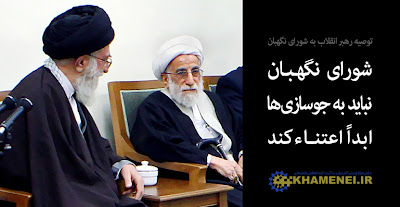 |
| Esfandiyar Rahim-Masha'ei standing next to a portrait of the poet Ferdowsi. Does he think he is the embodiment of Esfandiyar, Ferdowsi's legendary hero? |
Mr. Masha’ei, Ahmadinejad’s Medvedev, poses a grave dilemma for the Guardian Council. The Supreme Leader has openly spoken against him in the past, as an untrustworthy politician with dangerous ideas. He called on Ahmadinejad to strip him from all his official positions (he held many) particularly as his chief of staff. The President held his ground and refused to turn his back on his old friend. Esfandiyar Rahim-Masha’ei, he confided in his friends, is not a “willow that would tremble with a simple breeze.” But if they disqualify him from running in the next presidential election, they risk an unpredictable reaction from Ahmadinejad who seems determined to champion Masha’ei as his successor.
 |
| Ayatollah Jannati, the Head of the Guardian council trying to make sense of the Supreme Leader's advice! |
In his Shahnameh, the epic book of kings, composed between 977-1010 AD, the Persian poet Ferdowsi invests much of the power of his heroic poetry to describe the resilience and invincibility of Esfandiyar. In the Shahnameh, Esfandiyar signifies hope, loyalty, determination, and submission. He devotes his entire life to the King, his father, and despite his own suspicions about the King’s cunning and devious intentions remains faithful to the throne until his death.
 |
| A miniature depicting the battle of Rostam and Esfandiyar. Here you can see the double-headed arrow in his eyes! |
 |
| Statue of Esfandiyar in Ramsar, a Caspian Sea region town. |
Masha’ei is keen to present himself as a modern day
Esfandiyar, minus the shot through the eyes. Although his eyes, Ahmadinejad, remain vulnerable, he wants to change the ending of
the story, make the King content, capture Rostam, and spoil his dream of becoming the national
hero, an the savior of the nation. This week the foretellers of the court, the
Guardian Council, need to make a prediction. Should they allow Esfandiyar to
run for the battle of election? Should they ask the King to strike a deal with
him? Should they allow Rostam to rise from his old age and remind the King and the nation of his political touch of Midas?
 |
| Scene from a recent musical adaptation of "Rostam and Esfandiyar" in Tehran. |


No comments:
Post a Comment